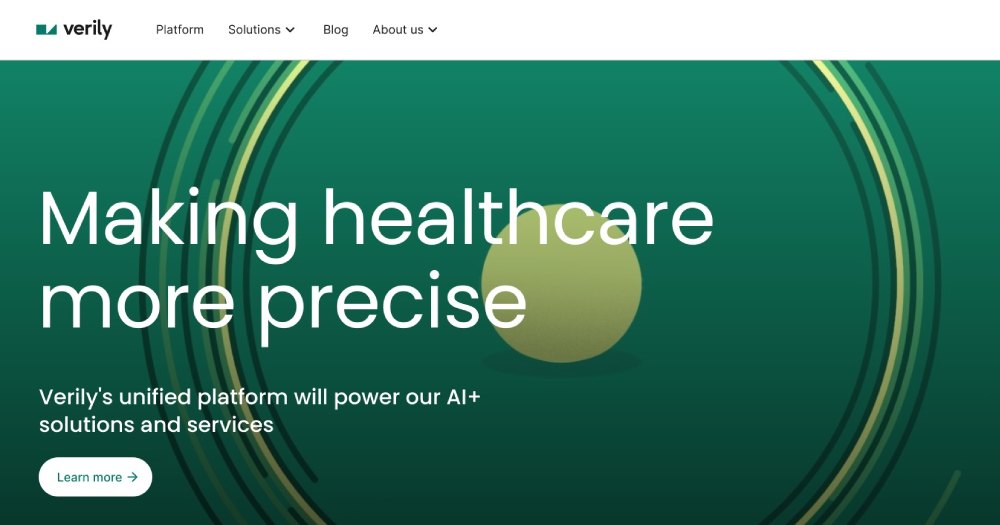Alphabet’s Verily looking to raise more money in 2025, break up with Google

Verily is stepping into 2025 with a bold, new agenda. Once just another ambitious Alphabet experiment, the healthcare-focused unit now aims to carve its own niche by betting big on artificial intelligence (AI). As it gears up to part ways with Google, Verily's leadership is doubling down on a strategy that centers on offering AI-driven tech solutions for other healthcare players. "We want to be the engine behind healthcare's AI revolution," hinted an insider privy to the company's plans.
With a fresh round of capital on the horizon, and a mission to mature into an independent business, the stakes couldn't be higher.
How will it work?
At the heart of Verily's new game plan lies a robust tech platform designed to help healthcare firms build AI models and apps. Whether it's a life sciences company developing precision therapies or a startup launching a health coaching app, Verily promises to offer the essential tools — data storage, AI training, and low-code app development.
"Pharma giants look at us and see a shortcut," Verily CEO Stephen Gillett told Fortune in a recent interview. Indeed, the company's platform will cater to complex needs like privacy compliance, consent management, and specialized data aggregation. Already, Verily supports clients like the National Institutes of Health (NIH) through its Workbench service, which hosts massive datasets and provides built-in analysis capabilities.
And it's not stopping there. Come 2026, Verily plans to reintroduce its health management app, Lightpath, with AI-powered coaching for chronic conditions like diabetes and hypertension. Think of it as having a personal health coach in your pocket, but way smarter.
Why does it matter?
Verily's pivot couldn't come at a more opportune time. As AI continues to disrupt industries left and right, healthcare remains a complex beast. Data privacy regulations, fragmented ecosystems, and the sensitive nature of medical data mean that AI solutions require a special touch. Verily believes its experience in handling clinical research and healthcare data gives it an edge.
"While most AI models are trained on general internet data, healthcare demands a tailored approach," said one executive. By positioning itself as a key enabler, Verily hopes to fill a critical gap in the market.
If successful, it could transform how healthcare organizations innovate, driving faster drug discovery, more personalized care, and better patient outcomes.
The context
Verily's journey hasn't exactly been a straight path. Born in 2015 as part of Google's moonshot division, the company initially explored a hodgepodge of futuristic ideas — from surgical robots to glucose-monitoring contact lenses. Some of these, like the contact lenses, fizzled out. Others, like its stop-loss insurance venture, Granular Insurance, turned into steady revenue streams.
But by 2023, with new CEO Stephen Gillett at the helm, it became clear that Verily needed a sharper focus. The company laid off 15% of its staff and started shedding non-core projects. Enter Myoung Cha and Bharat Rajagopal, hired earlier this year to steer product and revenue growth. Their arrival coincided with the shift toward AI.
Then there's the not-so-small matter of breaking away from Google. Under an internal initiative dubbed Flywheel, Verily has been gradually disentangling itself from Google's systems and perks. By the end of 2024, employees will lose access to many Google benefits — a change that hasn't gone unnoticed.
"Some folks may decide this isn't the right place for them anymore," Gillett reportedly told employees during a recent town hall.
Despite these hurdles, Verily remains resolute. The question now is whether it can turn its ambitious AI pivot into a profitable reality. As one observer put it, "Verily's future hangs on its ability to deliver... or get left in the dust."
💡Did you know?
You can take your DHArab experience to the next level with our Premium Membership.👉 Click here to learn more
🛠️Featured tool
 Easy-Peasy
Easy-Peasy
An all-in-one AI tool offering the ability to build no-code AI Bots, create articles & social media posts, convert text into natural speech in 40+ languages, create and edit images, generate videos, and more.
👉 Click here to learn more


